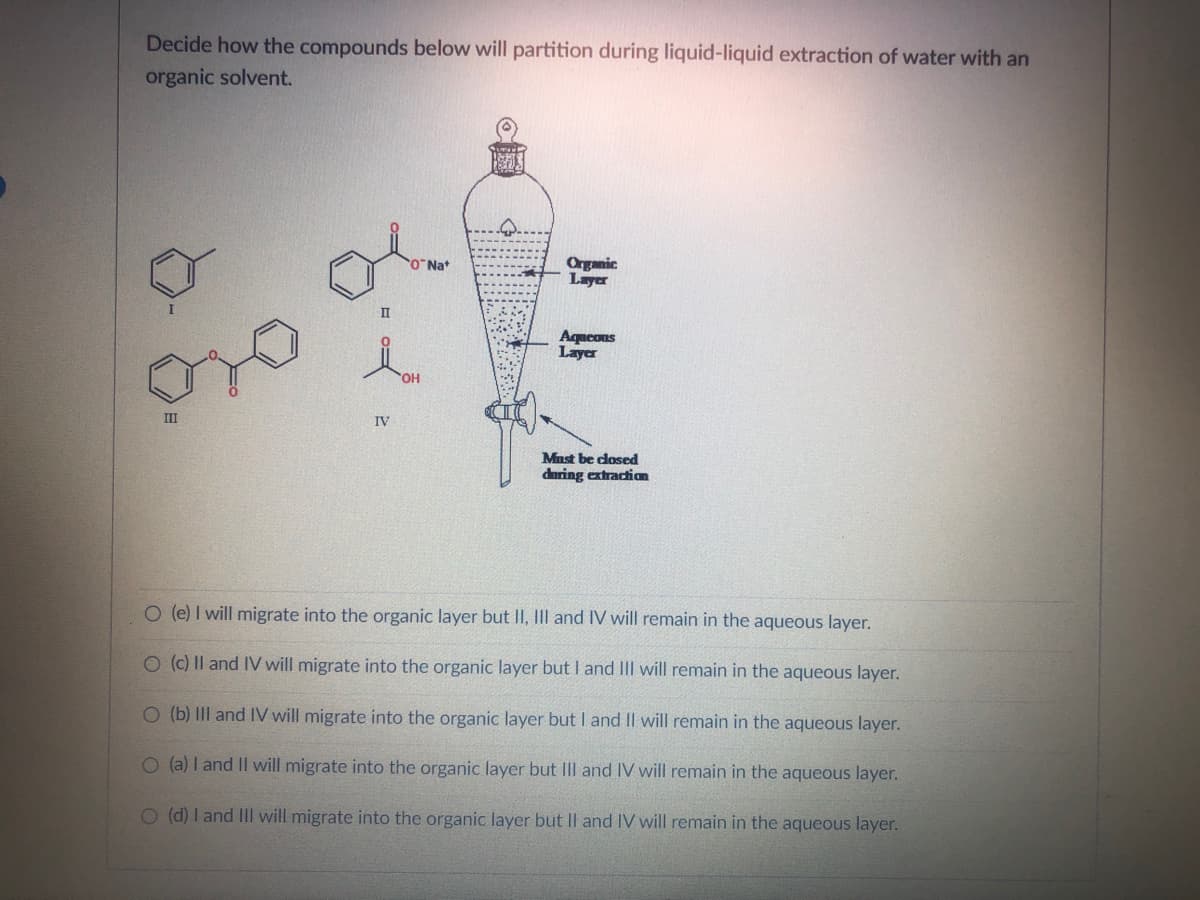Decide how the compounds below will partition during liquid-liquid extraction of water with an organic solvent. III II IV OH "Na+ Organic Layer Aqueous Layer Must be closed during extraction O (e) I will migrate into the organic layer but II, III and IV will remain in the aqueous layer. O (c) II and IV will migrate into the organic layer but I and III will remain in the aqueous layer. O (b) III and IV will migrate into the organic layer but I and II will remain in the aqueous layer. O (a) I and II will migrate into the organic layer but III and IV will remain in the aqueous layer. O (d) I and III will migrate into the organic layer but II and IV will remain in the aqueous layer.
Decide how the compounds below will partition during liquid-liquid extraction of water with an organic solvent. III II IV OH "Na+ Organic Layer Aqueous Layer Must be closed during extraction O (e) I will migrate into the organic layer but II, III and IV will remain in the aqueous layer. O (c) II and IV will migrate into the organic layer but I and III will remain in the aqueous layer. O (b) III and IV will migrate into the organic layer but I and II will remain in the aqueous layer. O (a) I and II will migrate into the organic layer but III and IV will remain in the aqueous layer. O (d) I and III will migrate into the organic layer but II and IV will remain in the aqueous layer.
Chapter12: Spectrochemical Methods
Section: Chapter Questions
Problem 7P
Related questions
Question

Transcribed Image Text:Decide how the compounds below will partition during liquid-liquid extraction of water with an
organic solvent.
III
II
IV
ONa+
OH
Organic
Layer
Aqueous
Layer
Must be closed
during extraction
O (e) I will migrate into the organic layer but II, III and IV will remain in the aqueous layer.
O (c) II and IV will migrate into the organic layer but I and III will remain in the aqueous layer.
O (b) III and IV will migrate into the organic layer but I and II will remain in the aqueous layer.
O (a) I and II will migrate into the organic layer but III and IV will remain in the aqueous layer.
O (d) I and III will migrate into the organic layer but II and IV will remain in the aqueous layer.
Expert Solution
This question has been solved!
Explore an expertly crafted, step-by-step solution for a thorough understanding of key concepts.
This is a popular solution!
Trending now
This is a popular solution!
Step by step
Solved in 2 steps

Knowledge Booster
Learn more about
Need a deep-dive on the concept behind this application? Look no further. Learn more about this topic, chemistry and related others by exploring similar questions and additional content below.Recommended textbooks for you


Principles of Instrumental Analysis
Chemistry
ISBN:
9781305577213
Author:
Douglas A. Skoog, F. James Holler, Stanley R. Crouch
Publisher:
Cengage Learning

EBK A SMALL SCALE APPROACH TO ORGANIC L
Chemistry
ISBN:
9781305446021
Author:
Lampman
Publisher:
CENGAGE LEARNING - CONSIGNMENT


Principles of Instrumental Analysis
Chemistry
ISBN:
9781305577213
Author:
Douglas A. Skoog, F. James Holler, Stanley R. Crouch
Publisher:
Cengage Learning

EBK A SMALL SCALE APPROACH TO ORGANIC L
Chemistry
ISBN:
9781305446021
Author:
Lampman
Publisher:
CENGAGE LEARNING - CONSIGNMENT